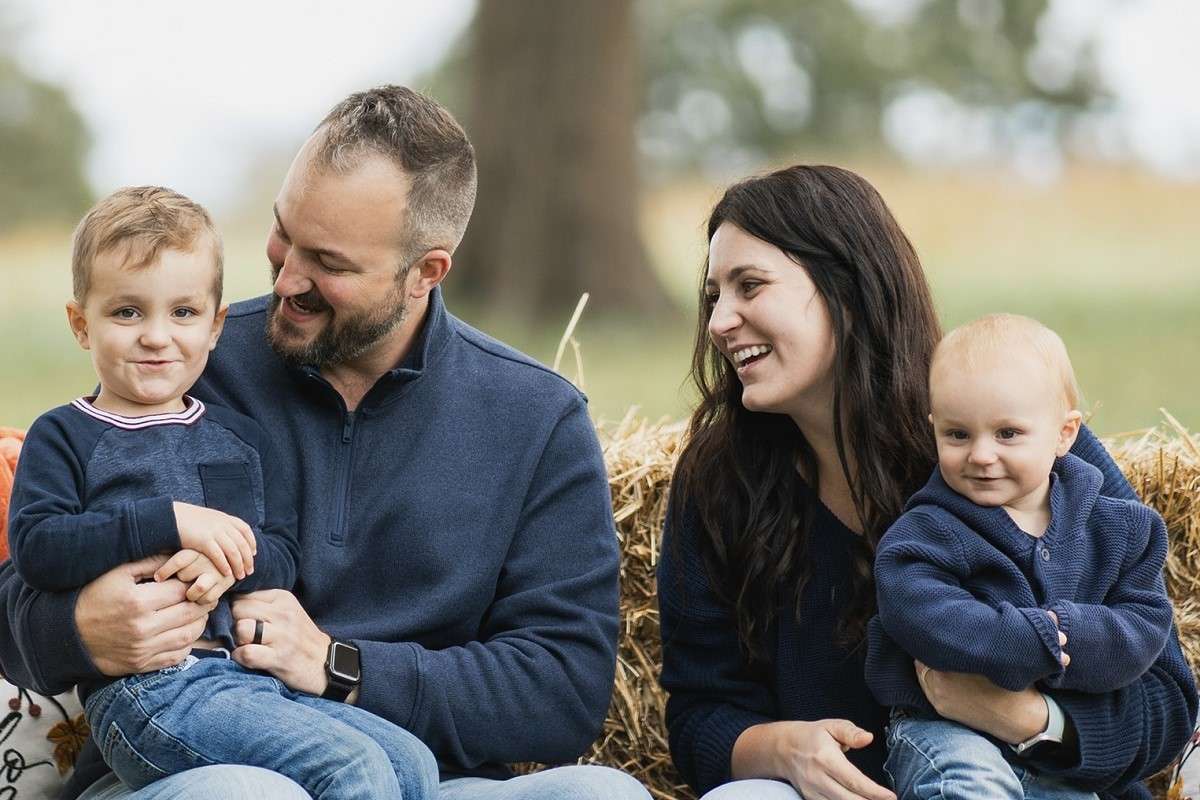
In Gibsonville, N.C., Hannah and Justin Nelson turned to IVF after endometriosis kept her from getting pregnant. Brent, now 3, was the much-welcomed result.
16:52 JST, March 3, 2024
Late last Saturday, after she’d put her two toddlers to bed in central North Carolina, Hannah Nelson spotted a troubling post in her Instagram feed: “The Alabama ruling & a Christian consideration of IVF.”
“Being pro-life does not mean ‘have babies through whatever means necessary,’” a Christian influencer had written of the recent ruling by Alabama’s Supreme Court that frozen embryos are children – a decision invoking God that quickly upended IVF treatment in the state, panicked many women there and elsewhere and sent legislators scrambling to respond.
Nelson, who conceived her son through IVF, is not normally political online. Her Instagram profile reads “Jesus follower. Wife. Mama. Optimist. School counselor.” But that post by Allie Beth Stuckey, who has more than a half-million followers, shocked and saddened her, and she felt compelled to push back.
“There is an ethical and Christian way to do IVF,” she wrote. “I am curious why you’re against that means of creating a family.”
Across red-state America, other conservative Christian women have had similar reactions since the Feb. 16 court ruling. Like Nelson, they usually post online about faith and family. In the past two weeks, though, they’ve become outspoken, even angry advocates. They’ve decried the Alabama ruling on their social media pages, galvanized to defend both their values and in vitro fertilization. Their comments have often appeared amid photos of the babies that IVF made possible.
Nelson, 30, resorted to the procedure after years of struggling with endometriosis. Her Instagram feed includes photos of her son’s embryo and then of 3-year-old Brent as a baby. (His onesie proclaimed “For this child we have prayed.”) She was able to conceive naturally with her second child, but she and her husband still have four embryos frozen that she plans to use someday.
“I never thought [IVF] was so polarizing. There’s mamas who I just truly believe are meant to be mamas that can’t do it without IVF,” said Nelson, a school counselor. She thinks the procedure “can be used for God’s glory” – and that “it’s best for the government to keep its hands out of it.”
In Pensacola, Fla., Emily Ley felt “a responsibility” to speak up – not only because she and her husband have friends across the border in Alabama whose IVF treatment was disrupted but because they’re worried about the implications for others.
“It’s only a matter of time before it starts to happen in other states. It just terrifies me,” she said.

Emily Ley gets two of her children, Caroline and Tyler, ready for school in Pensacola, Fla. The twins, who are 9, followed Ley’s in vitro fertilization.
The mother of three, who owns her own business, typically posts online about home organization to her 235,000 Instagram followers. She considers herself fiscally conservative yet socially liberal and most times stays away from political subjects. Not right now.
“The Alabama Supreme Court decision regarding IVF has brought me to tears no less than ten times in the last twenty four hours,” Ley, 41, explained online. She shared how she conceived her 9-year-old twins through IVF to underscore how the issue can hit close to home. “Limiting access to reproductive care is the opposite of progress,” she wrote. “Speak up with your voice. Speak out with your vote.”
Measures to grant “personhood rights” to the unborn – the crucial detail at the heart of the Alabama ruling was its declaration that frozen embryos are children – have been proposed in more than a dozen states this year. Alabama is among the several states that have already passed such laws.
The outcome of the court case put many legislators in Montgomery in a bind, and this week they responded with measures to ensure IVF will continue to be available there. A House committee hearing confronted the emotion of the issue when a Huntsville restaurateur named LeeLee Ray testified about all that she and her husband have gone through, still not successfully, to have a baby.
Ray, who identifies on Instagram as a “wife, IVF and surrogacy advocate, cooking enthusiast, follower of Christ,” recounted how the couple had spent $100,000 on IVF over the past six years. A surrogate they recently lined up in Colorado has cost $260,000 more, yet suddenly they couldn’t ship their embryos out of Alabama.
“We have got to have some sort of fast action to get us back into our treatments,” Ray beseeched the committee.
After sometimes heated debate, two bills passed the House and Senate on Thursday with near-unanimous support. Both would shield providers as well as patients from criminal and civil liability if embryos they create are subsequently damaged or destroyed. Gov. Kay Ivey (R) is expected to sign the version that lands on her desk.
Yet in a highly political year, with reproductive health care a central concern for many women, the issue is not likely to subside.
In Nebraska, a 34-year-old nurse whose baby was born through IVF also saw Stuckey’s post. She was “appalled” by how insensitive it seemed.
“Show others love, grace and sympathy rather than judgment,” Sara wrote back online. “I would encourage you to not only educate yourself further but to truly put yourself in a fertility patients shoes. This is not a road taken by choice and comes with great emotional struggle and stress.”
Like Nelson, the nurse was attacked by commenters on the site who said that neither she nor IVF was Christian. She asked to be identified only by her first name because of that reaction. Stuckey, an author who also hosts a biblically based podcast called “Relatable,” did not respond to a request for comment.
“They were attacking my faith. It bothered me to the core,” said Sara, a Southern Baptist who identifies as pro-life. “Because I had never viewed [IVF] as wrong, as anything other than beautiful and bringing another life into the world. … I’ve actually had a lot of friends pray for me and encourage me and help me along in the process.”
Speaking as a Christian and as a nurse, she added, “there are so many technologies that are man-made that continue to help people. I view those as a gift from God.”
Whether the most conservative states might now contemplate restrictions on IVF is some women’s greatest fear.
“This recent ruling is going to make future infertility journeys so complicated for many,” Kylie Hendrick, 27, wrote on Instagram from her home in Killeen, Tex., where the teacher has been undergoing infertility treatments for eight months. “I’m truly afraid for how it will affect other states with similar views.”
Her post sparked comments about when life begins, and Hendrick ultimately took it down. “I had a ton of people coming from both sides, and I just didn’t want to be arguing with people,” she said.
Hendrick has polycystic ovary syndrome and endometriosis. Her husband has male factor infertility. Guided by their faith – she was raised Catholic and now is nondenominational Christian – they intend to start IVF after he returns to Fort Hood in June from his latest Army assignment.
Her family is divided about the Alabama ruling, despite the in vitro procedure being key to the couple’s hopes.
“I had family members saying this was a blessing this came out because those lives are being protected and not discarded,” Hendrick said. “I had other family members saying it’s concerning for us knowing we’re going through infertility.”
She worries Texas could restrict IVF. She saw Gov. Greg Abbott (R) tell CNN last week that leaders plan to weigh in on the IVF debate and, “as a state, want to ensure that we promote life.”
“I’ve been looking at clinics out of state, if it comes to that,” she said.
To her dismay, the military clinics she called told her she likely would have to wait a year.
A friend of Hendrick’s in Houston, Lindsey White, is a University of Alabama graduate, an evangelical, pro-life Christian and a harsh critic of the Alabama Supreme Court’s decision. She considers it surprising and extreme and criticized it on Instagram.
“I just wish there was more compassion on the religious right,” White, 33, said this week. “You are punishing families trying to create a family. That’s crazy to me.”
Top Articles in News Services
-

Survey Shows False Election Info Perceived as True
-

Hong Kong Ex-Publisher Jimmy Lai’s Sentence Raises International Outcry as China Defends It
-

Japan’s Nikkei Stock Average Touches 58,000 as Yen, Jgbs Rally on Election Fallout (UPDATE 1)
-

Japan’s Nikkei Stock Average Falls as US-Iran Tensions Unsettle Investors (UPDATE 1)
-

Trump Names Former Federal Reserve Governor Warsh as the Next Fed Chair, Replacing Powell
JN ACCESS RANKING
-

Producer Behind Pop Group XG Arrested for Cocaine Possession
-

Japan PM Takaichi’s Cabinet Resigns en Masse
-

Man Infected with Measles Reportedly Dined at Restaurant in Tokyo Station
-

Israeli Ambassador to Japan Speaks about Japan’s Role in the Reconstruction of Gaza
-

Videos Plagiarized, Reposted with False Subtitles Claiming ‘Ryukyu Belongs to China’; Anti-China False Information Also Posted in Japan
























